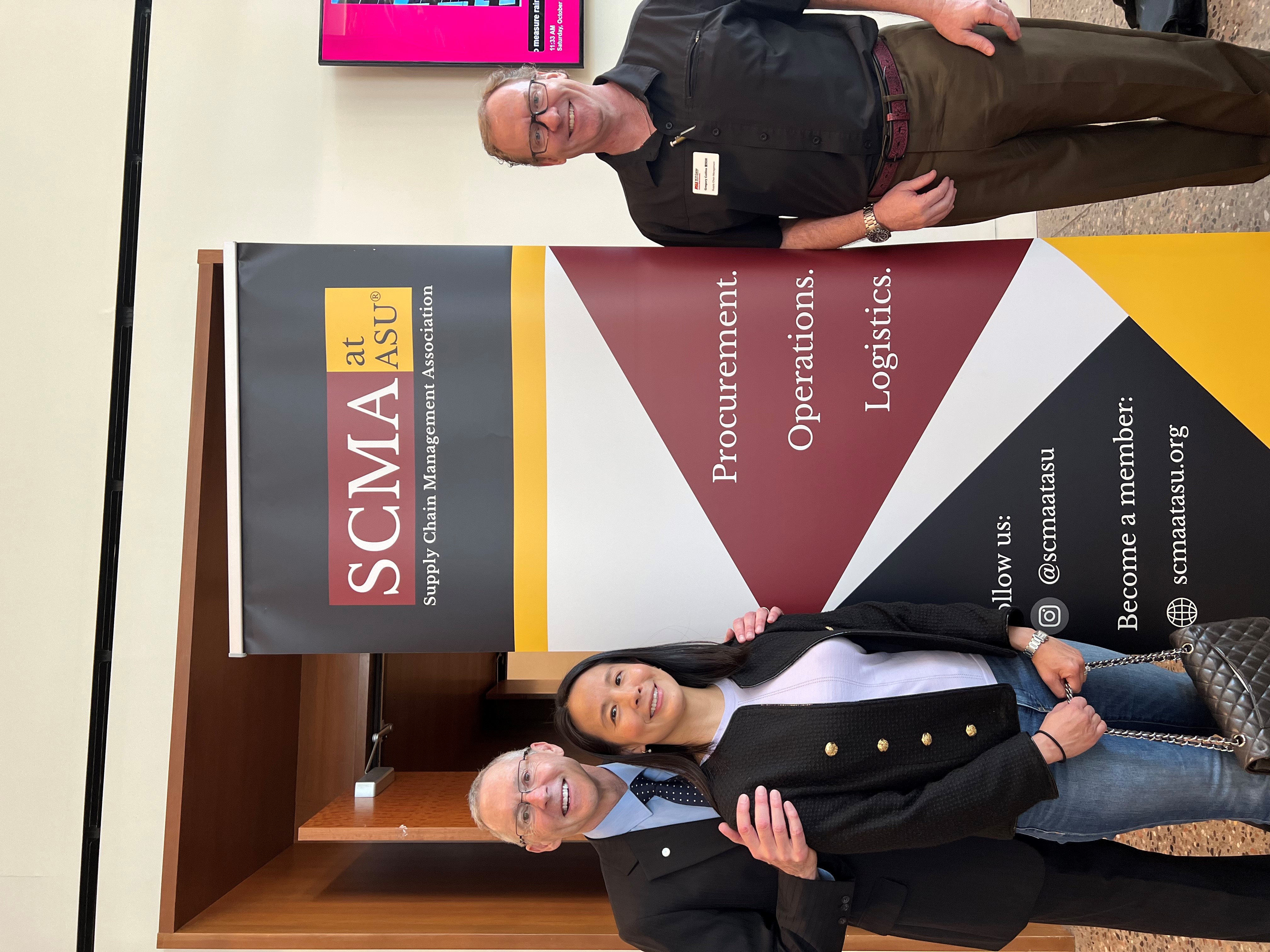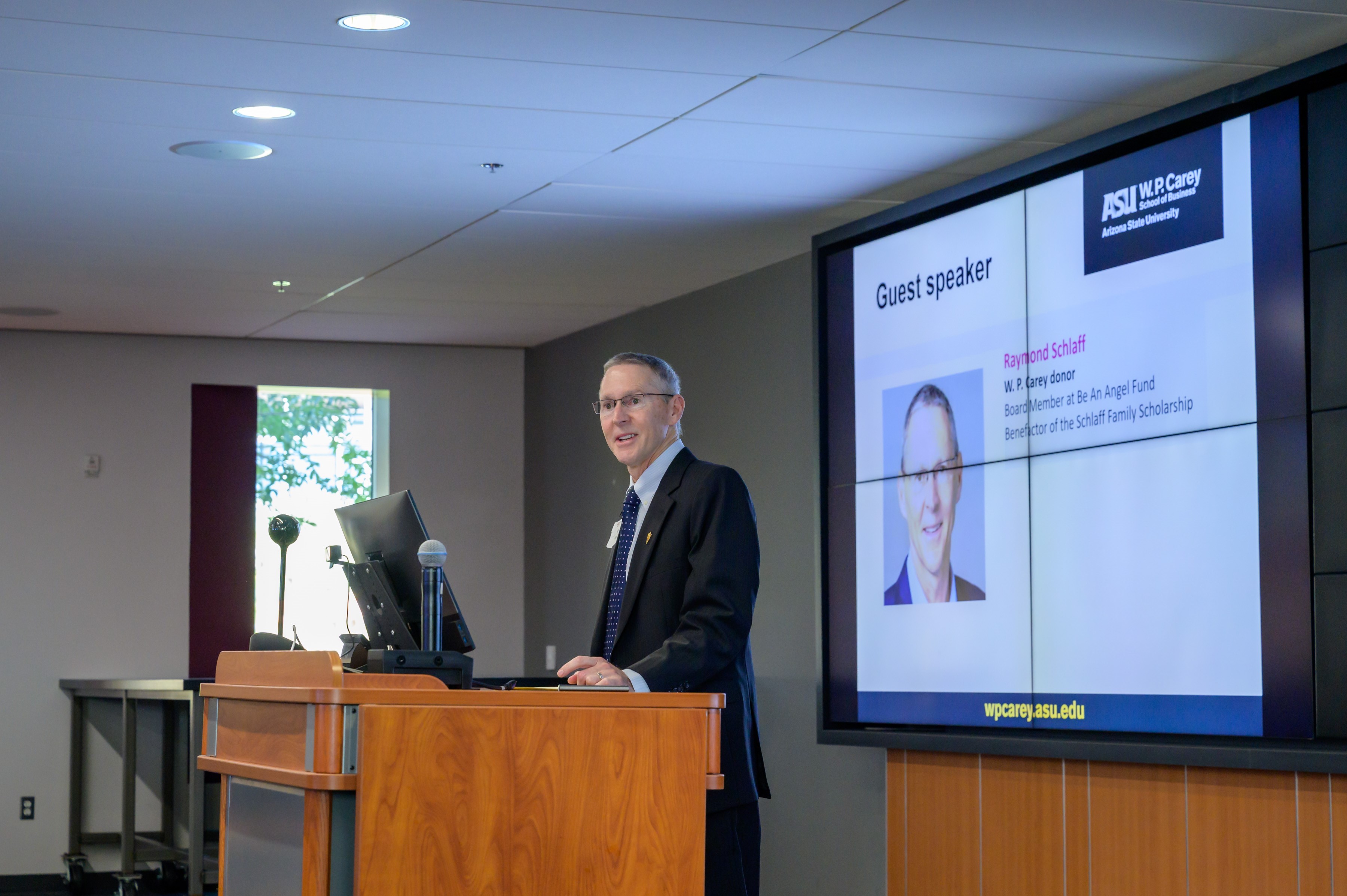
W. P. Carey alum prioritizes giving back to the Sun Devil community
Alum Raymond Schlaff (BS Management '78) and his wife, Shinlei Schlaff, founded the Schlaff Family Scholarship to support W. P. Carey supply chain students.
Reflecting on his undergraduate experience at ASU, Raymond Schlaff (BS Management '78) remembers balancing school work with part-time campus jobs, summer jobs, and student loans to make ends meet. Now retired after a fulfilling career in supply chain management, Schlaff is passionate about supporting students in similar situations pursuing their degrees.

"I had a great career and did things I never imagined possible. None of it would have been possible without my education," says Schlaff. "It changed my life to the point where I want to give back."
When Schlaff retired from his role as senior vice president and chief procurement officer at the global consulting and engineering company Wood, he and his wife, Shinlei Schlaff, prioritized giving back. They founded the Schlaff Family Scholarship in 2019, which awards two scholarships a year to supply chain management students with financial need. Schlaff also volunteers his time and business expertise on campus by mentoring scholarship recipients, speaking in W. P. Carey supply chain classes, judging the 2023 Supply Chain Management Association (SCMA) Case Competition, and acting as the keynote speaker during the 2021 W. P. Carey School of Business Scholarship Luncheon.
"It's not just about giving back financially but giving back with time, experience, and help when we can," says Schlaff.
Chain Reaction sat down with Schlaff to find out more about his education, philanthropy, and advice for young professionals.
Question: How did your ASU education prepare you for your career?

Answer: I took Purchasing 301 during my junior year, and it captured my imagination. It was something I could be good at and enjoy. Then I found out that dozens of companies come to ASU to hire people studying materials and logistics management, which sealed the deal for me.
Q: Why are you so passionate about supporting students pursuing higher education?
A: Giving back quickly became a priority when we started thinking about retirement. When I graduated, I didn't have two nickels in my pocket and had student loans to pay off. It dawned on us that we should be eternally grateful for the opportunities we've had because of ASU's education. I thought about other students in similar situations and wanted to make life just a little easier for some of those people. We created the Schlaff Family Scholarship for supply chain management majors with financial need. When I first entered the field, it was an old boys' club, and we didn't want it to be that way again. We're going to promote diversity in the field.
Q: You and Shinlei offer yourselves as mentors to scholarship recipients. Why is mentorship important to you?
A: No corporate executives were in my sphere of influence when I started my career. I had to learn everything in my career the hard way. If the scholarship recipients have questions about jobs or which path to take, we're happy to offer our time and advice. I've had some wonderful mentors who have opened doors for me and helped me build a network. They taught me the value of mentorship and how I could do that to help others. The scholarship is in its sixth year, and we still talk to most of the recipients periodically.

Q: You've volunteered your time on campus in several capacities. Why do you prioritize investing back in your community?
A: When I reflect on my career and what I've accomplished, it's abundantly clear none of it would have happened without my education. When I began thinking about giving back, ASU was the first place I started. It's meaningful and rewarding for me, and I see myself in many scholarship recipients and the classes I speak in. Although I have to say the field of supply chain has progressed exponentially — the technology and processes have progressed — and the students graduating now are so much smarter and more prepared than I was. It's amazing. Sometimes, I think they should be mentoring me!
Q: You're also a board member for the Be An Angel organization and the Las Vegas Search and Rescue.
A: Be An Angel is a Texas-based charity that provides adaptive equipment to profoundly disabled children. For example, in Texas, Medicaid offers hearing aids to children so they can learn, but the school takes the aid back at the end of the day, and children are only eligible to receive one hearing aid every five years from Medicaid. Be An Angel purchases hearing aids and other equipment, like wheelchairs, and provides them free of charge when the family can't afford it. The organization also takes children and their families to special camps each year, where everything is designed for children with disabilities so the whole family can interact and have a vacation.
When we retired in Las Vegas, I wanted to do something for the local community and joined the Las Vegas Search and Rescue Board. We have a search and rescue group led by the police, but volunteers do most of the work — including hiking, diving, and mountain climbing. We monitor 8,000 square miles of rough terrain and mountains, so anytime someone gets lost or hurt, we rescue them. My job is mainly finding the money to train the volunteers and equip them to go out and do the work.
Q: What's one business or life advice you'd give young professionals?
A: My first piece of advice is to be the person who helps everyone around you be better. In sports, there's always a Most Valuable Player, but the person who wins that award never just scores the most points — they're a person who scores a lot of points while helping everyone around them to be better. As a result, they're the team that usually wins the championships.
Secondly, when you take on a supervisory role, realize that your job is no longer to just do something well but to help others be successful. If the people who work for you get a big raise, bonus, promotion, or exciting opportunity, others at that company will see that and want to work for you. Once all the smartest people at the company work for you, imagine how easy your job becomes!
Don't let self-doubt keep you from taking on larger roles. On my first day as a vice president, I took the elevator to the executive floor, looked around my office, put my feet up on the giant oak desk, and had a 10- to 15-second anxiety attack. This job was much bigger than anything I'd ever done, and I wondered if I could do it. Six months later, I remembered that anxiety attack and reflected on how much we'd accomplished during that time. I thought to myself, "Gosh, I'm good at this! I should have done this sooner!" When I offer people a big promotion, I share that story with them and ask two things: Let me know if you have that anxiety so we can talk about it, and be sure to stop and reflect sometime later and think: What was I worried about?
Finally, I tell our scholarship recipients that one day it will be their turn to pay it forward. I ask them once they've achieved a certain level of success to remember how much this scholarship helped them to complete their education and to be the one who is giving back.
Latest news
- Ethical leadership: Good policy may prompt bad behavior
New research findings reveal how managerial approaches to integrity influence team morale and…
- W. P. Carey alum Paridhi Saboo found passion for analytics and real estate during undergraduate journey
Thanks to the many opportunities available to students at W. P.
- Here's how artificial intelligence is impacting health care
Artificial intelligence is rapidly becoming integral to every facet of health care, from…